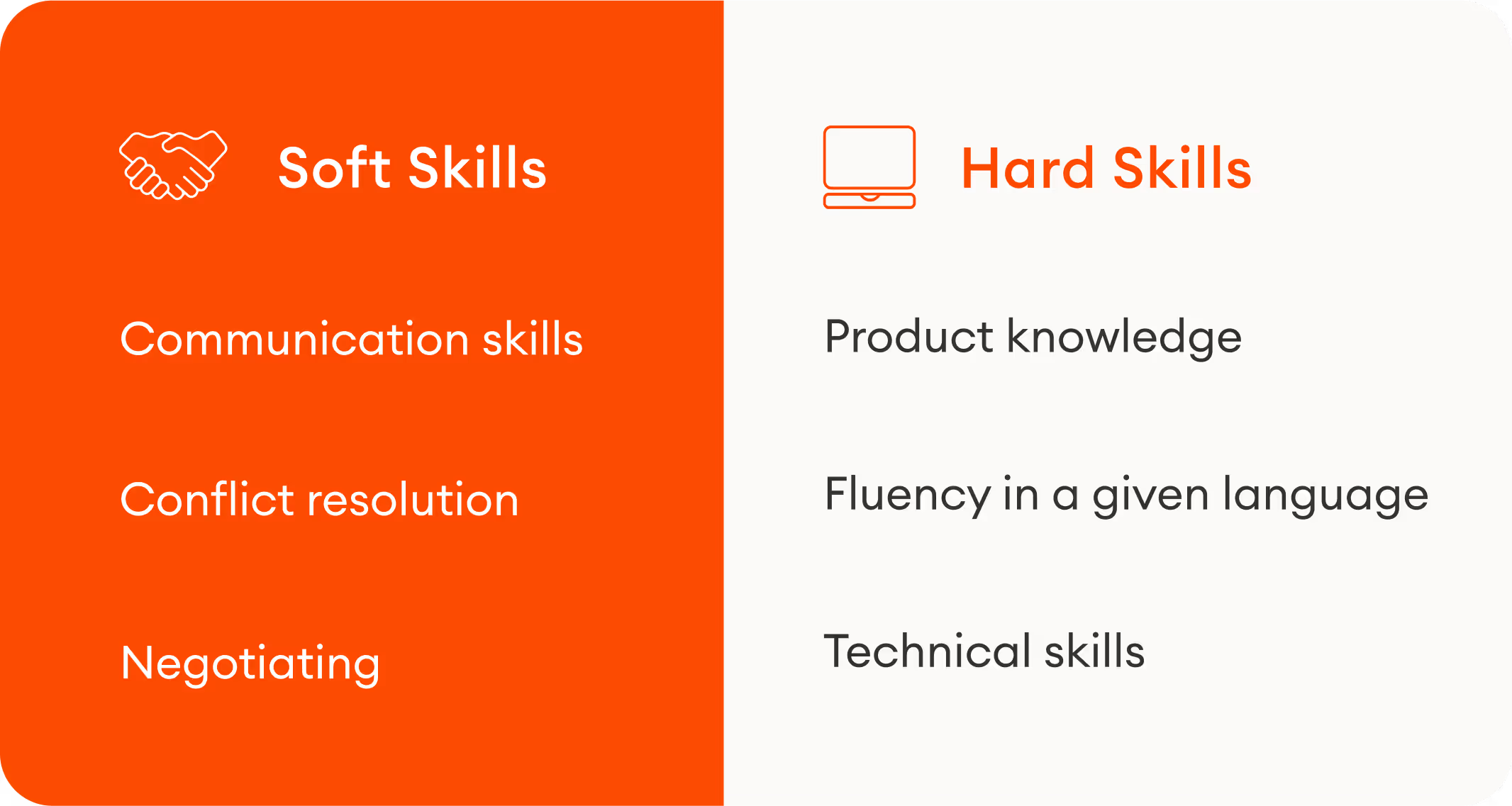In the competitive ecommerce marketplace, where products and services are nearly identical in terms of features or price, one factor plays an increasingly significant role — an exceptional customer experience.
According to Shopify, 70% of the customer journey is based on how a customer feels they’re being treated. So while quick solutions and technical knowledge are important, customer service soft skills — those intangible abilities to communicate effectively and empathize with customers — are the foundation for excellent customer support.
Which soft skills are most important in customer service? And why should your team invest in them? This blog post highlights the most in-demand skills and the benefits they offer customer service agents.
What are customer service soft skills?
Customer service soft skills are abilities and personality traits that enable support agents to interact more effectively with customers. They allow reps to navigate interpersonal relationships with ease. Soft skills can’t be formally taught, but it’s possible to improve them and gain new ones.
Examples of soft skills include:
- Communication skills
- Conflict resolution
- Negotiating
Although complementary in many ways, soft skills often serve as the yin to hard skills’ yang when it comes to excellent customer service. Hard skills are quantifiable skills that can be gained through education, formal training, and hands-on experience. These are tangible, measurable, and industry-specific.
Examples of hard skills include:
- Product knowledge
- Fluency in a given language
- Technical skills

Why are customer service soft skills important?
While hard skills equip representatives with needed technical knowledge, it's soft skills that empower them to employ this information humanely and effectively when dealing with customers. People won't always remember every detail you said or did — they will, however, remember how you made them feel. That’s why these customer service skills shouldn’t be an afterthought.
In customer service, soft skills put agents on the same wavelength as shoppers and enable them to understand customers’ needs on a deeper level. Reps who have fine-tuned their soft skills are better equipped to know how customers feel, what they want, and how to respond to them.
Soft skills are a key differentiator in customer service. As technology continues to evolve at an exponential rate — with AI customer service gaining momentum — the human touch becomes even more valuable. Our ability to listen actively, communicate efficiently, and react appropriately carries enormous weight in how we deliver excellent customer-centric service.
Ramp up your customer service team’s effectiveness with Zowie’s 23 Customer Service Tips from our own team of customer success experts.
9 key soft skills needed for effective customer service
Serving customers effectively calls for a unique set of soft skills. Here's an overview of the most important ones:
1. Active listening
Central to good customer service is active listening. When offering assistance in person, this involves reading a shopper’s body language and maintaining eye contact. When providing online support, active listening entails hearing the customer out without interruption, understanding their issues, and then responding constructively.
With active listening, you can do much more than reply with a solution. Agents can verbally confirm understanding, ask the right follow-up questions, and demonstrate interest in each shopper’s concerns with simple statements like I see how that’s a problem.
PRO TIP: Repeat back a summary of what customers say to ensure you understand what they’re saying and to show that you’re fully engaged.
2. Empathy
Effectively connecting with customers on a human level often means putting yourself in their shoes. This often equips agents with the ability to sense unspoken anxieties or displeasure, making it easier to offer the best possible solution in the end.
One principle lies at the heart of practicing empathy — treating each customer like a human with unique needs, not another number. Customer service representatives who exhibit empathy can deliver personalized replies and forge stronger bonds with shoppers, boosting customer satisfaction as a result.
PRO TIP: Use phrases like I understand how important this is for you to help customers feel heard and supported.
3. Patience
Customer service frequently involves dealing with distressed shoppers who can get a little long-winded. Representatives should exhibit patience by allowing customers sufficient time to express themselves without feeling rushed.
Finding a solution for some cases simply takes a lot of time. But remember, the benchmark for average resolution time over live chat is 10 minutes. This gives customer service agents ample time to talk through a shopper’s issue without worrying about KPIs.
PRO TIP: Hear customers out, and be sure to thank them for their patience whenever they need to wait for you. This can go a long way as you work toward a solution.
4. Staying calm
No matter what customers throw their way, support agents are the face of their organizations. That’s why keeping a level head under pressure is another important customer service soft skill. Especially when you’re interacting with frustrated customers, staying calm and collected is essential if you want a positive outcome.
In fact, using your emotional intelligence to work out an issue can transform most poor customer experiences into excellent ones. It’s all about having the know-how to defuse any tense situation. Reaffirm the customer’s feelings, speak gently, and get a firm grasp of their expectations. Practicing these steps will help reps guide shoppers through every step of a solution.
PRO TIP: Practice deep-breathing exercises or mindfulness techniques to manage stress and maintain composure in challenging situations.
5. Flexibility
Every day brings different challenges in customer service — angry customers today, a spike in incoming tickets tomorrow. To get through the various situations support reps need to handle, adaptability is king.
Being flexible in your customer responses is also useful. Top-performing agents know how to easily adjust their replies based on a given conversation’s circumstances — without sacrificing professionalism. Since 73% of shoppers want businesses to understand their unique situation, adapting to each customer’s needs is key to keeping customers happy.

PRO TIP: If a standard solution doesn’t work, explore alternatives and be willing to customize your responses. Adjust your communication style based on a customer’s preferences and the nature of their issue.
6. Time management
Every day, customer service representatives work on all kinds of tasks, including responding to customer inquiries in real time, addressing customer emails, and following up on any outstanding cases. Handling it all can get overwhelming — that’s why time management is an essential customer service soft skill.
74% of contact center reps are at risk of burning out. Keeping yourself organized by creating to-do lists, eliminating repetitive tasks, and working within a set timeframe can help agents better manage their workload, enhance productivity, and offer a better work-life balance.
Discover in-depth tips on how to refine your time management skills in our Mastering the Art of Time Management in Customer Service blog post.
7. Keeping a positive attitude
With a positive attitude and buoyant spirit, support reps have the power to turn the worst situations into pleasant experiences for customers. Even if you aren’t able to resolve every case successfully, contagious positivity can temper sour moods and mitigate dissatisfaction.
Here’s an easy hack for staying upbeat — keep your language positive. Steer clear of negative terms like can’t or don’t and replace them with positive statements. Focus on what you can do for customers instead of what you can’t do.
PRO TIP: Focus on what you can control and find the silver lining in any difficult case. View challenges as opportunities to showcase your dedication to exceeding customer expectations.
8. Problem-solving skills
Problem-solving prowess is crucial in resolving customer complaints. Many customer problems don’t have simple solutions, so agents need to be able to think outside the box to propose outcomes that leave customers walking away happy.
It’s also vital to go the extra mile whenever you’re unable to deliver exactly what a customer wants. Can you offer a discount or work out some kind of compromise? The best support reps are willing to take the time to work with shoppers to mitigate complaints and foster customer loyalty.
PRO TIP: Break down complex problems into smaller parts, consider alternative solutions, and be willing to adapt your approach based on the situation.
9. Critical thinking skills
Our last crucial customer service soft skill is critical thinking. Informed decision-making often depends on correctly processing the information at hand and making choices considering both the immediate ramifications as well as any far-reaching consequences.
Knowing how to think in tricky, complicated situations aids representatives in handling diverse customers efficiently. In doing so, agents promote organizational growth by improving customer satisfaction and, ultimately, conversion rates.
PRO TIP: Assess each case independently. Ask probing questions to gather details, and use your analytical skills to propose well-thought-out resolutions tailored to the customer's specific needs.
The benefits of customer service soft skills
Investing in customer service soft skills brings several benefits to any organization. It enhances interactions, reduces complaints, and uplifts agent morale, paving the path for valuable growth opportunities. Let's delve into the biggest advantages in detail.
1. Improved customer satisfaction and loyalty
The primary goal of any business is to satisfy its customers, and loyal patrons are a company’s most valuable asset. Learning how to communicate efficiently and empathetically can significantly enhance the interactions between your service team members and customers.
Think about the last time you had an outstanding customer service experience — it likely involved a courteous agent who listened attentively to your concerns. And after such stellar interactions, customers tend to leave glowing reviews, tell their friends, or make a repeat purchase.
Soft skills enable support agents to create positive experiences that delight customers. When support reps exercise patience or listen actively, it’s much easier for them to understand what customers truly want. These customer service skills empower them to deliver enhanced interactions that build customer satisfaction and loyalty over time.
2. Improved agent morale
Support reps who have honed their soft skills produce stronger, more confident teams within organizations. They aren’t daunted by challenging cases because they genuinely look forward to successfully resolving a customer’s issue.
With the right soft skills, agents grasp the idea that they aren’t just answering customer questions — they’re solidifying relationships. They feel more capable and approach each conversation with increased engagement and enthusiasm. This heightened morale results in better productivity and undeniably impacts customer sentiment as well.
3. Reduced customer complaints
Regardless of how great a product might be, customer inquiries or complaints are bound to arise. Soft skills give agents the good judgment needed to successfully navigate these cases.
Reps can get to the root of a problem faster — or proactively prevent an issue from occurring outright — cutting a team’s total number of complaints or escalations. And the ability to reduce the amount and severity of complaints agents receive highlights just how capable they are at addressing customer issues at the earliest stages — a testament to their overall efficiency.
Missouri Star Quilt Company: customer service skills in action
Missouri Star Quilt Company is an ecommerce leader that sells quilting fabrics and accessories. From day one, approaching each customer conversation in a personalized and empathetic way — in their unique brand voice — has been a top priority. That’s why their team of 30+ agents was put to the test when the business began to see sustained growth in customer demand.
Missouri Star turned to Zowie, an AI-powered customer service automation platform, to assist with this rise in tickets. Not only does Zowie maintain their brand voice to charm customers in automated replies, but it reduces their agent workload, meaning their specialized reps have time and effort to freely work through more complex tickets with customers.
Missouri Star’s agents can shine by offering meaningful personal assistance while Zowie resolves the bulk of support tickets over chat and email alike.
See what else Missouri Star Quilt Company achieved with Zowie — including an 85% chat recognition rate — in their full success story.
Zowie — enhancing your team’s customer service skills
Effective customer service isn't an innate attribute that employees can master through some guidebook. Developing human-centric soft skills is necessary for true success. And these skills can lead to marked improvements in agent efficiency, customer satisfaction, and overall business performance.
That’s why we designed our customer service automation solution to give agents the breathing room to showcase their full potential.
Zowie is the only AI-powered customer service software tailor-made to help teams maximize efficiency and unlock their revenue-generating capabilities.

.avif)

.avif)
.svg)







